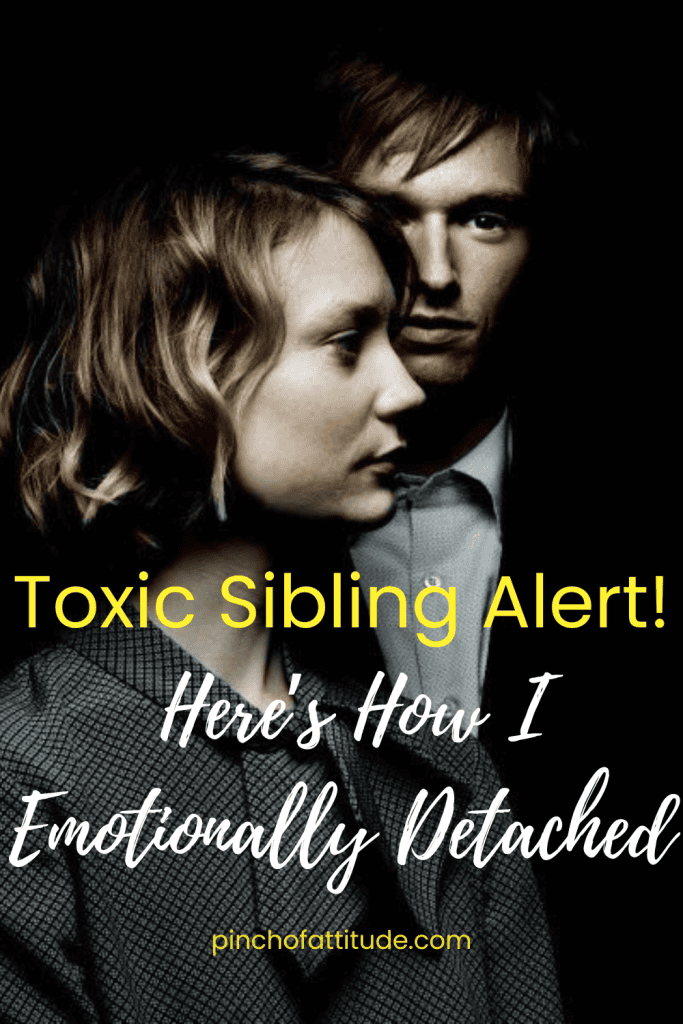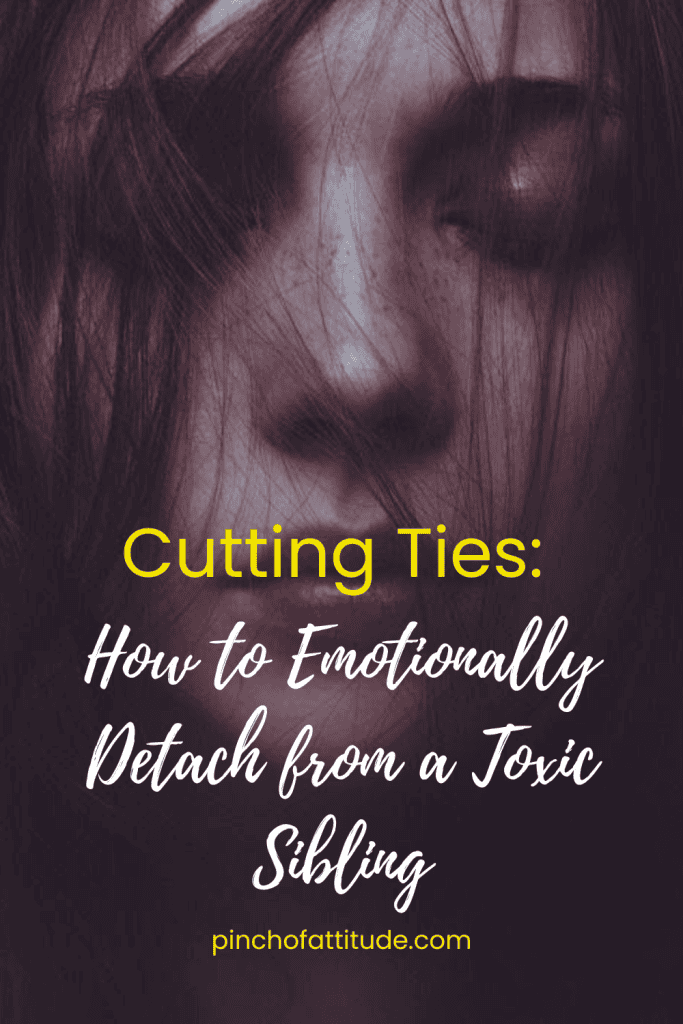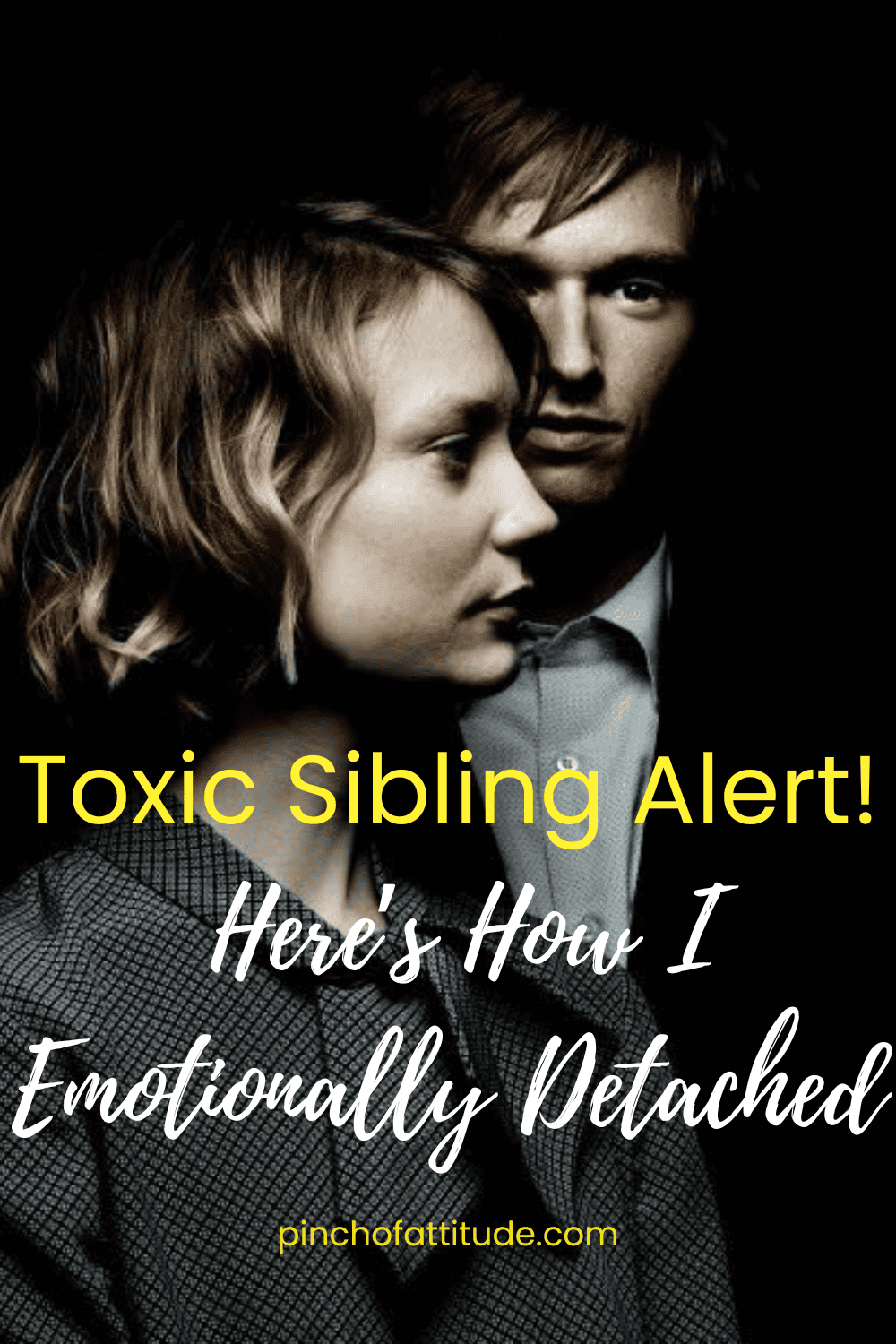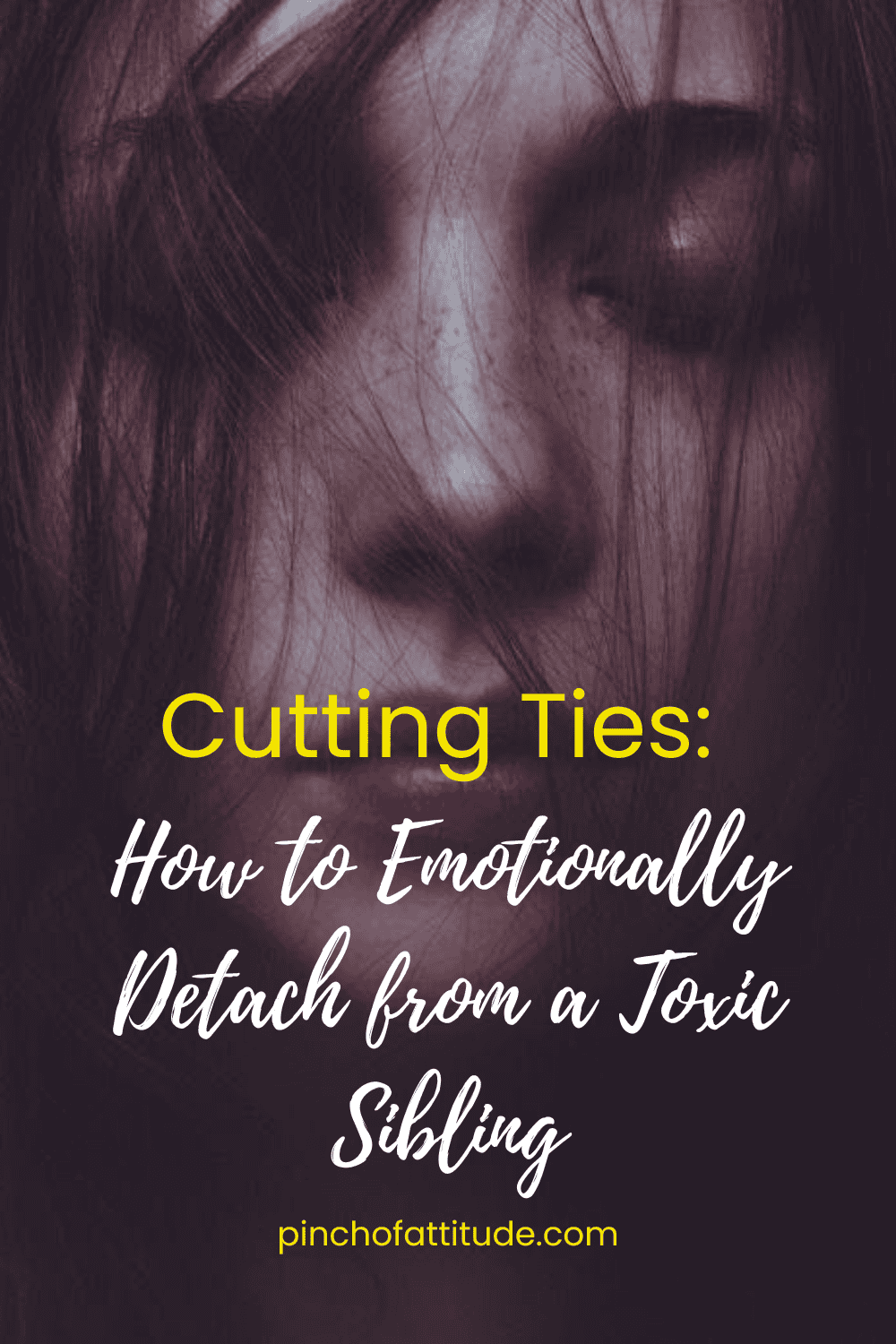Being the opinionated middle child that I am, I grew up stuck with the “black sheep” label while my siblings got away with everything.
As it turned out, our mom’s favoritism bred toxicity, and before I knew it, both my sister and brother were pulling me down.
So, yes, I know how hard it is to deal with a toxic family. But I’m here to talk about one dysfunctional family member in particular — my toxic brother.
After years of trying to mend the relationship, I found myself asking, “How do you emotionally detach from a toxic brother when you practically share a DNA strand?”
Let me tell you, it’s a process, but there is light at the end of the tunnel.
Below, I’ll share with you what I learned about detaching from a toxic sibling based on my own experience surviving a not-so-picture-perfect family.
- It’s okay to detach from a toxic sibling. Prioritize your mental health by setting boundaries and letting go of negativity.
- You get to write the next chapter of your life. The space you create lets you explore new interests and build healthy connections.
- Detachment doesn’t mean you stop loving your brother. It means finally focusing on your well-being.
Table of Contents
How Do You Emotionally Detach From a Toxic Brother?

Years of trying to force a healthy connection with my brother left me drained and confused.
And then, I realized that sometimes the best way to deal with a toxic sibling relationship is to learn to manage it, not necessarily mend it.
Here are strategies to do just that:
1. Acknowledge Your Heartache and Confusion
Admitting you need to detach from your brother can be heartbreaking. So, expect to feel a confusing mix of anger, sadness, and maybe even a flicker of hope they’ll change.
But that emotional pain you’re feeling is a signal. It’s your body telling you something needs to change.
In my case, the whole experience made me question my self-esteem and my perception of things.
If you’re going through the same thing, remind yourself that dealing with toxic family members doesn’t make you a bad person or a weak one.
It actually takes courage to recognize that their behavior is unhealthy and that you need to protect yourself from further harm.
And by acknowledging your hurt, you regain control of the situation.
2. Write Down How You Feel and Reflect on That
Frustration and anger often cloud our judgment when dealing with a toxic brother.
That’s why writing down my feelings, both recent and past, became a powerful tool for me to gain clarity. It wasn’t easy, but it was the wake-up call that I needed.
Ask yourself: Was it a constant barrage of put-downs? Did his actions leave you feeling belittled and unheard?
Journaling your emotions can help you see a pattern and recognize that these behaviors are not your fault.
Let your written words help you navigate this challenging situation.
Sometimes, putting pen to paper reveals the difficult truth that it might be time to walk away from a toxic relationship with a sibling.
Remember, detachment doesn’t mean you don’t love someone, but it may mean prioritizing your well-being.
3. Embrace the Power of Letting Go With Grace
The decision to distance yourself from your brother might feel like giving up, but it’s actually a powerful form of self-care.
Stop trying to change someone who isn’t ready to grow.
Remember all that emotional energy you poured into trying to make the relationship work? Letting go allows you to redirect that energy inward.
You see, detachment doesn’t mean becoming cold-hearted. It means accepting that you don’t have control over their behavior.
Letting go with grace means accepting the reality of the situation and choosing to prioritize your peace of mind.
It’s about creating healthy boundaries that protect your well-being, even if it means letting go of the brother you once wished you had.
Tip
Don’t waste your time trying to force a connection that isn’t healthy for you. Invest your energy in those who build you up.
4. Find Strength in Your Vulnerability and Emotional Journey
Detaching from a sibling felt like I was betraying the special bond I thought we shared. But the truth is there’s nothing to feel guilty about.
What my journey made me appreciate is my strength to be vulnerable and acknowledge that a core relationship isn’t working.
It doesn’t mean that your sibling relationships are doomed or there’s something wrong with you. You’re simply taking control of what you can control – yourself.
This act of self-care opens the door to healthier connections, ones that uplift and empower you, not drain you.
5. Cherish Memories but Refrain From Dwelling on Them
Toxic people can be charming, but their negativity often outweighs the good. This is why it’s important to set clear boundaries.
Letting a toxic sibling go doesn’t erase your history. Instead, it allows you to cherish the positive memories of your sibling bond without getting caught up in the negativity.
Holding onto those memories can make it harder to move forward.
In my case, I look at it like curating a mental museum exhibit. I can now appreciate the past without it letting define my present.
Let the happy memories be a reminder of the kind of connection you deserve, not a reason to stay tethered to the past.
6. Nurture Your Inner Peace Through Mindfulness and Meditation
Meditation has been my anchor since I was 13, not only to deal with sibling rivalry but also to process everything else that’s happening at home.
Taking just a few minutes each day to quiet your mind and focus on your breath can be incredibly calming.
It can help you process difficult emotions and find inner peace, a crucial tool for anyone dealing with any toxic relationship.
Of course, it’s not a magic bullet, but it is a powerful step if you want to take care of your mental and emotional health.
7. Build a Cocoon of Self-Love and Self-Care
Focusing on self-love and self-care means you need to learn how to set boundaries in all areas of your life.
For example, you can call and let your sibling know you’re done tolerating his toxic behavior. If he reacts negatively or starts invalidating your experiences, just hang up the phone.
As for me, to show myself love, I prioritized activities that brought me joy and nurtured my well-being.
All the hobbies I’d neglected, walks in nature, and spending time with friends became my priorities. Family gatherings? I limited my time or politely declined.
Remember, it isn’t about punishment, it’s about taking care of yourself. You can still choose to have some contact with your sibling but on your terms.
8. Talk With Your Trusted Friends or Family Member
While your sibling may not be someone you can confide in, you can choose your family.
Even if the rest of the family is off-limits, you can still build a loving and supportive network around you.
In my case, having a healthy relationship with my cousins became a lifeline.
Talking to trusted friends or even a supportive family member outside the immediate circle can be a powerful source of solace.
Tip
Don’t be afraid to lean on those who uplift and support you. They can be a source of strength and a reminder that you’re not alone.
9. Allow Yourself to Grieve the Lost Connection

My relationship with my brother was a part of me, a connection I’d known my entire life.
But as the reality of the situation sunk in, I realized letting them go was necessary to detach from the negativity.
Yes, it’s okay to grieve the loss of this relationship, even if it was a toxic one. You’re grieving the loss of the sibling you once had, someone you’ve known for years.
Allow yourself to feel the sadness, the anger, and the confusion. Bottling up those emotions will only hinder your healing.
Acknowledge your pain, but don’t let it consume you. With time, the intensity of the grief will lessen, and you’ll be able to move forward with a lighter heart.
10. Embrace New Beginnings and Opportunities for Growth
The difficult relationship you have with your brother may have shaped you, but it doesn’t define you.
You get to write the next chapter, and it can be filled with joy, love, and endless possibilities.
So, embrace this newfound freedom to explore new interests, build positive connections, and live the life you deserve.
Remember, the need to detach emotionally from someone doesn’t diminish your capacity for love – for yourself and others.
It simply means you recognize your worth and that you deserve to be treated with respect.
11. Reflect on Your Personal Values and How They Guide You
Reflecting on the values that hold the most influence on your life will help you understand why a relationship with someone toxic will never work.
You see, when your core values clash constantly with someone’s behavior, it creates a toxic dynamic.
When I realized this, I started asking what truly mattered to me in my relationships, and honesty, respect, and mutual support rose to the top.
This introspection helped me identify what I would and wouldn’t tolerate in my life and finally pushed me to decide that it was time to cut ties completely.
Why is Detachment From a Toxic Sibling Necessary?
Detaching from a toxic sibling is necessary to protect your mental and emotional well-being.
Their negativity can drain you and hinder your ability to build healthy relationships.
However, by detaching physically and emotionally, you create space for positive influences and prioritize your peace of mind.
In my experience, holding onto the toxic relationship I had with my brother meant wasting energy on someone who didn’t care about me.
By breaking free from that negativity, I was able to create space for healthy relationships to flourish in my life.
Tip
While it may be painful, you need to emotionally detach from someone you love when they become toxic to protect yourself from their hurtful behavior.
Related Posts:
- Toxic Brother Relationships: Signs, Root Cause & How to Heal
- What to Do if Your Brother Is Toxic? Steal My 13 Drama-Free Tips
- How Do You Deal With a Toxic Brother? My Simple but Effective Strategies
- When Should You Let Go of a Toxic Brother? My Answer From Personal Experience
- How to Cut Ties With Your Toxic Brother? It Was Worth It for Me
Frequently Asked Questions
Is emotional detachment a form of cutting ties, and how does it differ from complete separation?
Emotional detachment means withdrawing from emotions while maintaining some connection. Complete separation involves cutting off all ties and connections entirely.
Can emotional detachment be achieved while maintaining a relationship with your toxic brother?
Yes, it can be achieved while maintaining a relationship with a toxic brother by setting boundaries and prioritizing self-care. A mental health professional can help navigate this process.
How long does it typically take to detach from your toxic brother emotionally?
The time it takes to emotionally detach from a toxic brother varies for each person. It can range from several months to years and depends on the nature of the relationship.
What are some signs that indicate a successful emotional detachment from your toxic brother?
You’ve successfully emotionally detached from your brother when you don’t feel obligated to maintain the relationship, feel less affected by his behavior, and have set clear boundaries without guilt.
Can emotional detachment be achieved without guilt or feelings of abandonment?
Yes. You can do this by recognizing the need for self-preservation and understanding that the decision to detach is about self-care, not abandonment.





brothers constantly having digs and said im too sensitive,im filled with anxiety when hes around he comes out with sexual talk about what hes done with a woman,it sickens me, he asked if he could stay at my house and i said no then the spitefulness started ive let him stay at least 4 times in the last month i dont want to be nasty but hes horrible to me most of my family are not really interested in him ive made an effort but now i cant be bothered